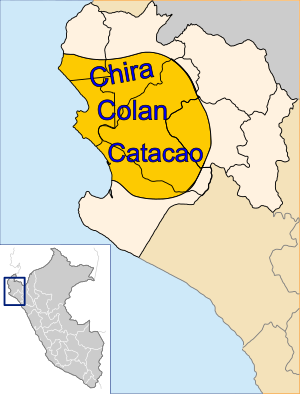Catacaoan languages
Appearance
| Catacaoan | |
|---|---|
| Geographic distribution | Piura Region, Peru |
| Linguistic classification | Sechura–Catacao?
|
| Subdivisions |
|
| Language codes | |
| Glottolog | tall1235 (individual languages covered by Tallán) |
 Location of the Catacaoan languages within Piura Region | |
The Catacaoan languages are an extinct family of three languages spoken in the Piura Region of Peru. The three languages in the family are:[1]
- Catacao or Katakao, once spoken around the city of Catacaos
- Colán or Kolán, once spoken between the Piura River and Chira River
- Chira or Lachira or Tangarará, once spoken along the Chira River. It is unattested.
- The Atlas of the World's Languages includes the Leco language in the Catacaoan group.
In Glottolog, the two attested languages, Catacao and Colán, are subsumed into the extinct Tallán language as dialects.
Vocabulary comparison
[edit]| English | Colan | Catacao |
|---|---|---|
| drink | kum | konekuk |
| heart | ñessini-m | ñiesiñi-čim |
| water | yup | yup |
| woman | pi-m | pi-čim |
| fire | huyur | guanararak |
| daughter | hiku-m | yku-čim kapuk |
| son | hiku-m | yku-čim |
| river | yup [water] | tuyurup |
| brother | pua-m | pua-čim |
| grass | aguakol | taguakol |
| man | yatadla-m | aszat |
| moon | nag | nam |
| eat | agua | agua-čim |
| sea | amum | amaum |
| mother | nu-m | ni-čim |
| dead | dlakati | ynata-klakatu |
| bird | yaiau | yeya |
| bone | dladlapi-ram | lalape-čen |
| rain (v.) | ñar | ñarakñakitutin |
| rain (n.) | nug | guayakinum |
| fish | llas | llas |
| branch | yabiti-ram | yabike |
| rule (v.) | čañar | čañak |
| sister | puru-m | puru-čim |
| sun | turinap | nap |
| earth | dlurum | durum |
| trunk | tuku-ram | taksikáas |
| wind | kuiat ñap | vik |
Genetic relations
[edit]Loukota compares Catacaoan to the Culle language and the Sechura language but does not make any claims about genetic relatedness.[2]
References
[edit]- ^ Loukotka, Čestmír (1968). Classification of South American Indian Languages. Los Angeles: UCLA Latin American Center.
- ^ a b Loukotka, Čestmír (1949). "Sur quelques langues inconnues de l'Amérique du Sud". Lingua Posnaniensis (in French). 1: 53–82.
- ^ Loukotka was based in the list of the bishop Baltasar Jaime Martínez Compañón: «43 voces castellanas traducidas alas ocho lenguas que hablan los indios de la costa, sierra y montañas del obispado de Trujillo del Perú, por el obispo de esta misma ciudad, baltazar Martinez de Compañón», written circa 1780.
